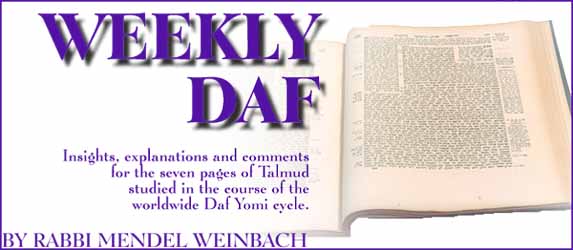Weekly Daf #230
Eiruvin 63-69 Issue #230
12-18 Tammuz 5758 / 6 July-12 July 1998
This publication is also available in the following formats: ![]()
![]()
![]() Explanation
of these symbols
Explanation
of these symbols
Sleeping it "On"
Sobriety is an absolute necessity both for prayer and for ruling on matters of halacha. But even if one has come under the influence of wine, says the Sage Rami bar Abba, he can return to a sober state by walking the distance of a mil (roughly a kilometer) or by sleeping a bit.
A qualification of this sobering solution is provided, however, by Rabbi Nachman in the name of Rabba bar Avuha. Only when a revi'is of wine (86 grams) is imbibed will sleep have a sobering effect. If one drinks more than this, sleep will only make him more intoxicated.
This gemara can help us explain a halacha mentioned in Shulchan Aruch (Orach Chaim 695:2), based on the ruling of the Sage Rava (Mesechta Megilla 7a), that on Purim one must drink wine until he can no longer distinguish between "cursed be Haman and blessed be Mordechai." In contrast to the literal interpretation which suggests excessive drinking, Rema cites an opinion that it is sufficient to drink more than one is accustomed to and then go to sleep, "since when he is asleep he is unable to distinguish between cursed be Haman and blessed be Mordechai."
On the basis of the aforementioned gemara about the relationship between wine and sleep, it may be concluded that it is not drink-induced sleep which is the Purim state of confusion prescribed by Rema, but rather the state of intoxication induced by sleeping after drinking more than the customary measure of a revi'is.
The Three Indicators
You can tell a man by three things, says Rabbi Iloui. By his drinking (kosso), his pocketbook (kisso) and his temper (ka'asso).
A good man, the Sage informs us, is one who can hold his liquor, deal honestly in business and control his temper (Rashi).
This basic interpretation is expanded upon by Maharsha:
All human characteristics can be divided into three categories - man's relationship with Heaven, with his fellow man and with himself.
Whether one deals honestly in his affairs with others determines whether he is good or bad towards his fellow man. How he behaves when he has drunk more than a little spirits is an indication whether he is good or bad in caring for himself. How quick he is to anger is a criterion to Heaven, for our Sages have taught us that one who is prone to anger is considered as if he worships idols.
This oft-quoted Talmudic advice is borne out by so much human experience. The veneer which some people of poor character affect in their routine activities is exposed when they are challenged to hold their drink or temper, or to refrain from cutting corners in order to earn another dollar at someone else's expense.
General Editor: Rabbi Moshe Newman
Production Design: Eli Ballon
© 1998 Ohr Somayach International - All rights reserved. This publication may be distributed to another person intact without prior permission. We also encourage you to include this material in other publications, such as synagogue newsletters. However, we ask that you contact us beforehand for permission, and then send us a sample issue.
This publication is available via E-Mail
Ohr Somayach Institutions
is an international network of Yeshivot and outreach centers, with branches in North America, Europe, South Africa and South America. The Central Campus in Jerusalem provides a full range of educational services for over 685 full-time students.The Jewish Learning Exchange (JLE) of Ohr Somayach offers summer and winter programs in Israel that attract hundreds of university students from around the world for 3 to 8 weeks of study and touring.
Dedication opportunities are available for Weekly Daf. Please contact us for details.







